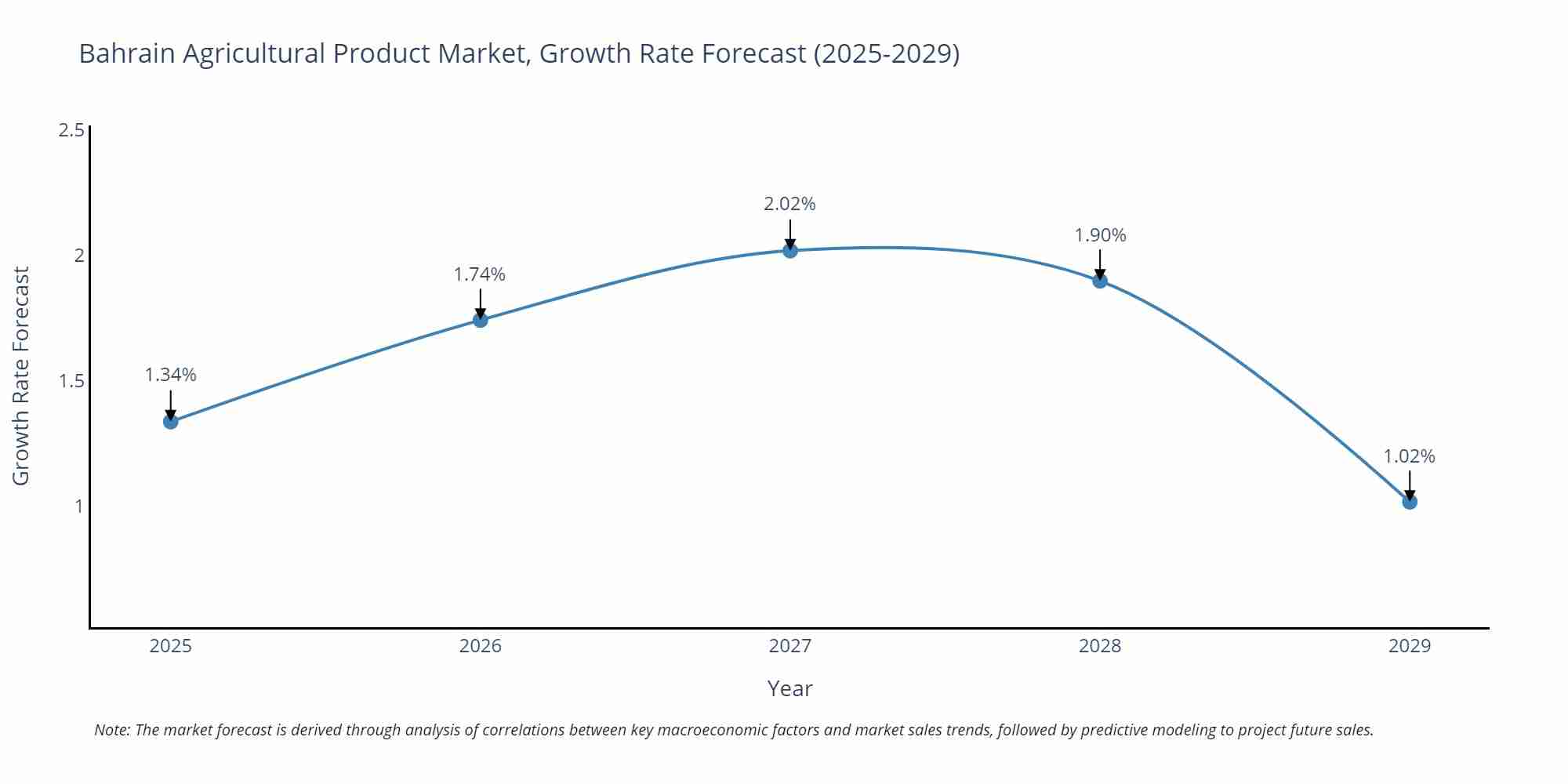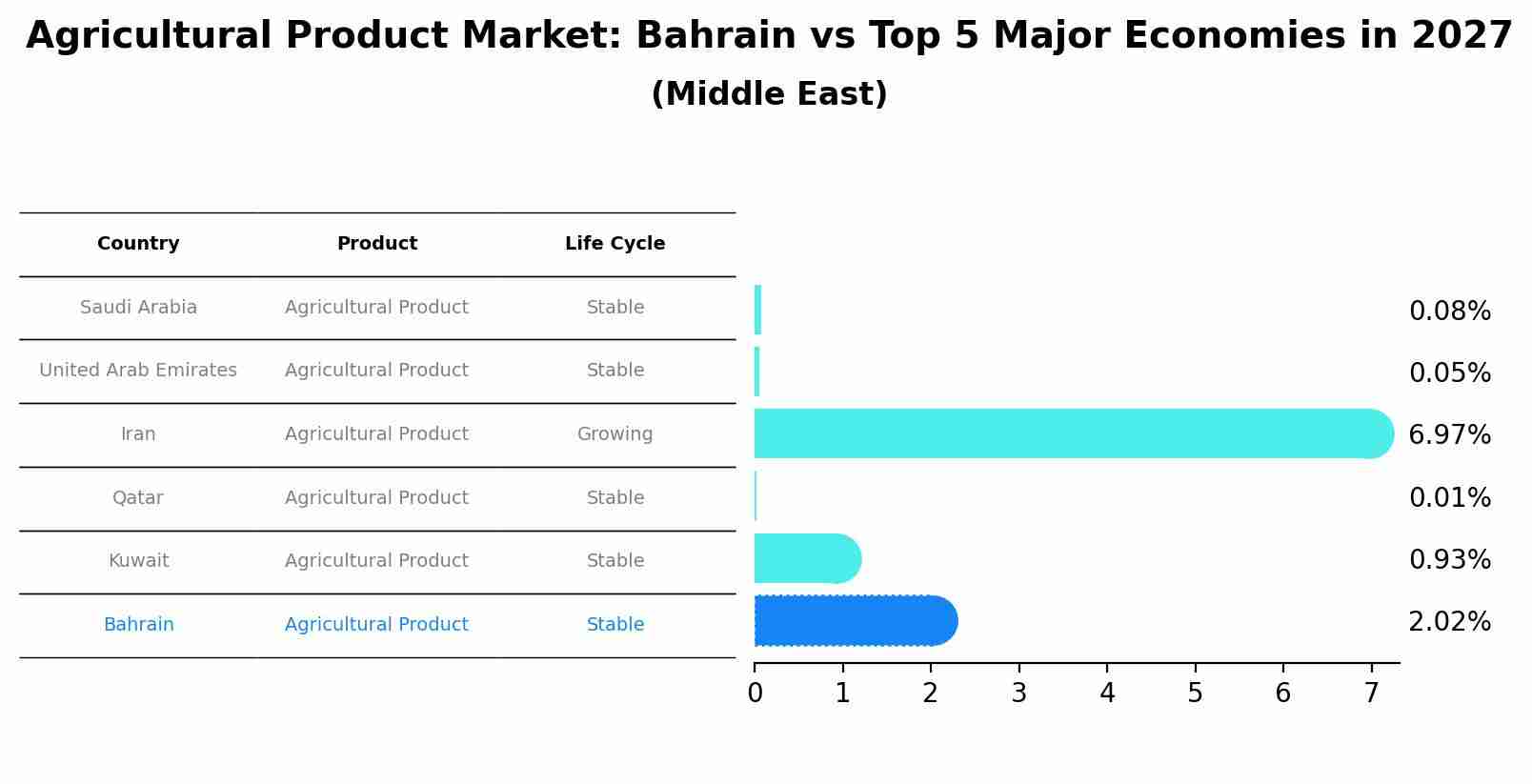Bahrain Agricultural Product Market (2025-2031) Outlook | Value, Share, Trends, Industry, Analysis, Growth, Forecast, Size, Companies & Revenue
| Product Code: ETC379664 | Publication Date: Aug 2022 | Updated Date: Apr 2025 | Product Type: Market Research Report | |
| Publisher: 6Wresearch | Author: Shubham Padhi | No. of Pages: 75 | No. of Figures: 35 | No. of Tables: 20 |
Bahrain Agricultural Product Market Size Growth Rate
The Bahrain Agricultural Product Market is projected to witness mixed growth rate patterns during 2025 to 2029. The growth rate begins at 1.34% in 2025, climbs to a high of 2.02% in 2027, and moderates to 1.02% by 2029.

Agricultural Product Market: Bahrain vs Top 5 Major Economies in 2027 (Middle East)
In the Middle East region, the Agricultural Product market in Bahrain is projected to expand at a stable growth rate of 2.02% by 2027. The largest economy is Saudi Arabia, followed by United Arab Emirates, Iran, Qatar and Kuwait.

Bahrain Agricultural Product Market Synopsis
Bahrains agricultural product market is shaped by limited arable land and high reliance on imports. Nonetheless, the country is making efforts to boost local food production through greenhouse farming, hydroponics, and aquaponics. Key products include fruits, vegetables, and dates. Government incentives and technology adoption in farming are aimed at reducing dependency on imports and ensuring food security.
Trends of the market
Bahrains agricultural product market, though limited by arable land, is evolving due to increased investments in controlled-environment agriculture and hydroponic farming. The country is focusing on improving food security through local production of fruits, vegetables, and herbs. Market trends reflect growing consumer demand for organic and pesticide-free produce. Government support, including subsidies and technological assistance for sustainable farming practices, is further stimulating this sector`s growth.
Challenges of the market
The Bahrain Agricultural Product Market includes a variety of fresh fruits, vegetables, grains, and livestock, catering to both local consumption and export needs. The market is supported by Bahrains emphasis on food security and sustainable agriculture. However, challenges include the country`s harsh climate, which limits local agricultural production, and the reliance on imports to meet the growing demand. Water scarcity and high operational costs for farmers further complicate the growth of the market. Additionally, the agricultural sector faces competition from low-cost foreign producers, making it difficult for local producers to remain competitive in both price and quality.
Investment opportunities in the Market
Bahrains agricultural sector is growing, and investors can benefit from the increasing demand for locally grown products, such as fruits, vegetables, and herbs. With an emphasis on sustainable farming practices, such as hydroponics and vertical farming, investors can cater to both local consumers and businesses in the food industry. Additionally, by focusing on organic and pesticide-free products, there is a lucrative market opportunity, especially in urban farming solutions.
Government Policy of the market
The agricultural product market in Bahrain is crucial for meeting the needs of the growing population. Despite the countrys arid climate, advances in agricultural technology and sustainable farming practices have allowed for the production of various crops. Bahrain imports a significant portion of its agricultural products, but local farming initiatives, including hydroponics and vertical farming, have been growing in importance. The market is also influenced by government initiatives aimed at ensuring food security and promoting local agriculture.
Key Highlights of the Report:
- Bahrain Agricultural Product Market Outlook
- Market Size of Bahrain Agricultural Product Market, 2024
- Forecast of Bahrain Agricultural Product Market, 2031
- Historical Data and Forecast of Bahrain Agricultural Product Revenues & Volume for the Period 2021 - 2031
- Bahrain Agricultural Product Market Trend Evolution
- Bahrain Agricultural Product Market Drivers and Challenges
- Bahrain Agricultural Product Price Trends
- Bahrain Agricultural Product Porter's Five Forces
- Bahrain Agricultural Product Industry Life Cycle
- Historical Data and Forecast of Bahrain Agricultural Product Market Revenues & Volume By Type for the Period 2021 - 2031
- Historical Data and Forecast of Bahrain Agricultural Product Market Revenues & Volume By Food for the Period 2021 - 2031
- Historical Data and Forecast of Bahrain Agricultural Product Market Revenues & Volume By Fiber for the Period 2021 - 2031
- Historical Data and Forecast of Bahrain Agricultural Product Market Revenues & Volume By Fuel for the Period 2021 - 2031
- Historical Data and Forecast of Bahrain Agricultural Product Market Revenues & Volume By Raw Material for the Period 2021 - 2031
- Historical Data and Forecast of Bahrain Agricultural Product Market Revenues & Volume By Application for the Period 2021 - 2031
- Historical Data and Forecast of Bahrain Agricultural Product Market Revenues & Volume By Direct Consumption for the Period 2021 - 2031
- Historical Data and Forecast of Bahrain Agricultural Product Market Revenues & Volume By Food & Fabrics for the Period 2021 - 2031
- Historical Data and Forecast of Bahrain Agricultural Product Market Revenues & Volume By Construction & Paper Products for the Period 2021 - 2031
- Historical Data and Forecast of Bahrain Agricultural Product Market Revenues & Volume By Others for the Period 2021 - 2031
- Historical Data and Forecast of Bahrain Agricultural Product Market Revenues & Volume By Industry Vertical for the Period 2021 - 2031
- Historical Data and Forecast of Bahrain Agricultural Product Market Revenues & Volume By Food & Nutrition for the Period 2021 - 2031
- Historical Data and Forecast of Bahrain Agricultural Product Market Revenues & Volume By Sustainable Agribusiness for the Period 2021 - 2031
- Historical Data and Forecast of Bahrain Agricultural Product Market Revenues & Volume By Production & Harvesting for the Period 2021 - 2031
- Historical Data and Forecast of Bahrain Agricultural Product Market Revenues & Volume By Agribusiness Technological Inputs for the Period 2021 - 2031
- Historical Data and Forecast of Bahrain Agricultural Product Market Revenues & Volume By Others for the Period 2021 - 2031
- Bahrain Agricultural Product Import Export Trade Statistics
- Market Opportunity Assessment By Type
- Market Opportunity Assessment By Application
- Market Opportunity Assessment By Industry Vertical
- Bahrain Agricultural Product Top Companies Market Share
- Bahrain Agricultural Product Competitive Benchmarking By Technical and Operational Parameters
- Bahrain Agricultural Product Company Profiles
- Bahrain Agricultural Product Key Strategic Recommendations
Frequently Asked Questions About the Market Study (FAQs):
- Single User License$ 1,995
- Department License$ 2,400
- Site License$ 3,120
- Global License$ 3,795
Search
Thought Leadership and Analyst Meet
Our Clients
Related Reports
- Afghanistan Apparel Market (2026-2032) | Growth, Outlook, Industry, Segmentation, Forecast, Size, Companies, Trends, Value, Share, Analysis & Revenue
- Canada Oil and Gas Market (2026-2032) | Share, Segmentation, Value, Industry, Trends, Forecast, Analysis, Size & Revenue, Growth, Competitive Landscape, Outlook, Companies
- Germany Breakfast Food Market (2026-2032) | Industry, Share, Growth, Size, Companies, Value, Analysis, Revenue, Trends, Forecast & Outlook
- Australia Briquette Market (2025-2031) | Growth, Size, Revenue, Forecast, Analysis, Trends, Value, Share, Industry & Companies
- Vietnam System Integrator Market (2025-2031) | Size, Companies, Analysis, Industry, Value, Forecast, Growth, Trends, Revenue & Share
- ASEAN and Thailand Brain Health Supplements Market (2025-2031) | Strategy, Consumer Insights, Analysis, Investment Trends, Opportunities, Growth, Size, Share, Industry, Revenue, Segments, Value, Segmentation, Supply, Forecast, Restraints, Outlook, Competition, Drivers, Trends, Demand, Pricing Analysis, Competitive, Strategic Insights, Companies, Challenges
- ASEAN Bearings Market (2025-2031) | Strategy, Consumer Insights, Analysis, Investment Trends, Opportunities, Growth, Size, Share, Industry, Revenue, Segments, Value, Segmentation, Supply, Forecast, Restraints, Outlook, Competition, Drivers, Trends, Demand, Pricing Analysis, Competitive, Strategic Insights, Companies, Challenges
- Europe Flooring Market (2025-2031) | Outlook, Share, Industry, Trends, Forecast, Companies, Revenue, Size, Analysis, Growth & Value
- Saudi Arabia Manlift Market (2025-2031) | Outlook, Size, Growth, Trends, Companies, Industry, Revenue, Value, Share, Forecast & Analysis
- Uganda Excavator, Crane, and Wheel Loaders Market (2025-2031) | Strategy, Consumer Insights, Analysis, Investment Trends, Opportunities, Growth, Size, Share, Industry, Revenue, Segments, Value, Segmentation, Supply, Forecast, Restraints, Outlook, Competition, Drivers, Trends, Demand, Pricing Analysis, Competitive, Strategic Insights, Companies, Challenges
Industry Events and Analyst Meet
Whitepaper
- Middle East & Africa Commercial Security Market Click here to view more.
- Middle East & Africa Fire Safety Systems & Equipment Market Click here to view more.
- GCC Drone Market Click here to view more.
- Middle East Lighting Fixture Market Click here to view more.
- GCC Physical & Perimeter Security Market Click here to view more.
6WResearch In News
- Doha a strategic location for EV manufacturing hub: IPA Qatar
- Demand for luxury TVs surging in the GCC, says Samsung
- Empowering Growth: The Thriving Journey of Bangladesh’s Cable Industry
- Demand for luxury TVs surging in the GCC, says Samsung
- Video call with a traditional healer? Once unthinkable, it’s now common in South Africa
- Intelligent Buildings To Smooth GCC’s Path To Net Zero


















